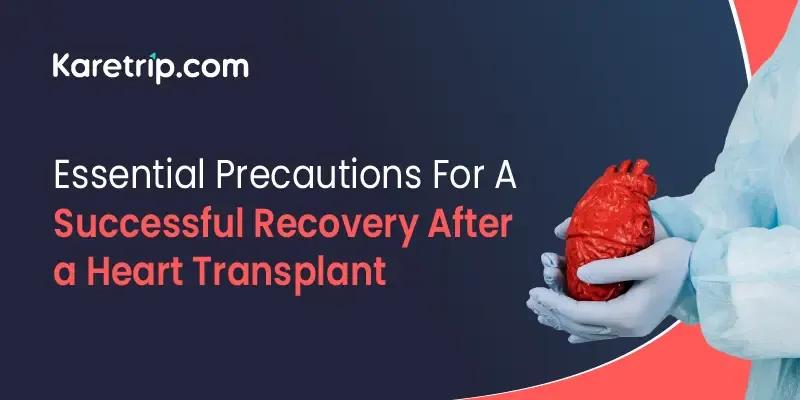Essential Precautions For A Successful Recovery After a Heart Transplant
In This Article
Essential Precautions For A Successful Recovery After a Heart Transplant
Jaymala
Updated on October 18, 2024
Medically verified by Dr. Arya
Fact checked by Dr. Fazeela

Cardiology
10 min read
If you are looking for essential procedures, which you should follow for a successful recovery after a heart transplant, then this blog is perfect for you.
Karetrip is here for you to provide essential precautions for a successful recovery after a heart transplant so that your journey becomes comfortable.
Post-Surgery Monitoring
You need to go for regular check-ups with your transplant team. Regular echocardiograms and electrocardiograms (ECGs) are conducted to assess how well your new heart is functioning. You may need to for routine heart biopsies, especially during the first year after the transplant.
You should check your blood test reports to monitor your overall health and detect any signs of organ infection. You should monitor your heart rate, blood pressure, and weight daily. Immunosuppressant drugs are important to prevent the body from rejecting the new heart.
Immunosuppressant Medication Adherence
- You should take your doses on time so that your body accepts the transplanted heart.
- Skipping doses or taking the wrong amount can lead to organ rejection or serious infections.
- There may be few side effects such as high blood pressure, kidney damage, and diabetes.
- You should follow the doses as prescribed by your doctor.
- Regular blood tests are conducted to monitor the levels of immunosuppressants in the bloodstream.
- Dosages are often adjusted to keep drug levels in the therapeutic range.
- Few medications, herbal supplements, and certain foods can interfere with the effectiveness of immunosuppressants.
- Immunosuppressant therapy is lifelong after a heart transplant.
- You should be educated enough to adhere to your medications and know the risks factors as well.
Infection Prevention
- You should wash your hands regularly with soap and water, especially before eating and after using the restroom.
- You should avoid close contact with people who are ill. Wear a mask in high-risk environments such as hospitals or public spaces with a high infection rate.
- Make sure that your food is properly cooked and stored. Grapefruit and pomegranate can interfere with immunosuppressant drugs. Also, avoid unpasteurized dairy products and juices.
- Cleaning the surfaces that are frequently touched, such as doorknobs, countertops, and light switches, is essential. Follow the vaccination schedule recommended by your transplant team.
- You should be well aware of symptoms like fever, fatigue, or pain.
- Any sign of infection should be reported to the transplant team immediately.
- Make sure that your transplant team follows strict sterile procedures during medical visits.
- Stay away from smoking, or any other lung irritants.
- You should keep yourself hydrated.
Healthy Lifestyle Choices
You should make a few healthy choices to prevent high blood pressure and fluid retention. Avoid trans and saturated fats; focus on healthy fats such as those from nuts, olive oil etc.
Include physical exercises such as walking or light stretching under medical supervision. Try to regain your strength and stamina.
You should check your weight to ensure you are within a healthy range for your heart.
Focus on steady, long-term weight loss if necessary. Limit alcohol to a small amount. Practice yoga, meditation, or deep breathing exercises to reduce stress.
 9 min
9 min Best Cardiac Hospitals in Bangalore: Heart Care Specialists
 10 min read
10 min read5 Causes Of Heart Failure You Should Know About
 10 min read
10 min readHeart Disease: Important Signs, Symptoms and Types of Heart Problems
Get a Callback Now
Physical Activity and Rehabilitation
Engage yourself in a cardiac rehabilitation program designed for heart transplant patients. These programmes gradually increase your physical activity in a safe environment. Start with short, slow-paced walks.
Walking is an excellent way to reintroduce physical activity into your routine without straining the heart. As you get stronger, slowly increase the duration and intensity of your activities.
Your doctor will guide you on how to safely ramp up exercises, typically after 6-12 weeks. Try to build your muscle strength without overexertion.
You should be careful about any of the warning signs such as dizziness, shortness of breath, chest pain, etc. Aim for at least 30 minutes of moderate exercise most days of the week.
Try activities such as running, basketball, or contact sports, until fully approved by your doctor.
Emotional and Psychological Support
- It is very common to experience anxiety, or even guilt after the transplant. You should speak with a therapist or psychologist, as it can help manage anxiety.
- Join a heart transplant support group as it will help you to connect with others who have undergone similar experiences.
- If you are under a lot of stress and worry, try to engage yourself in certain relaxation techniques.
Techniques such as progressive muscle relaxation, visualization, or spending time in nature can help calm the mind and reduce anxiety. Maintain your social interactions, even if limited, as it will help combat loneliness and isolation during the recovery process.
Routine Health Monitoring
- Regular visits may be required after your surgery. These visits slowly reduce over time, but regular follow-ups are needed for life.
- Regular ultrasounds of the heart monitor how well the transplanted heart is pumping and detect any issues like heart failure or rejection.
- High blood pressure is common after a heart transplant due to immunosuppressant medications.
- Monitor your blood pressure daily or as advised by your healthcare provider. Any changes should be reported to your doctor immediately.
- Some immunosuppressants can increase blood sugar levels, putting you at risk for diabetes.
- Regular glucose testing, especially after meals, can help detect any issues early.
- Sudden weight gain can indicate fluid retention, which might suggest heart failure or kidney issues. Weigh yourself daily and report any significant changes to your weight.
Long-Term Medication Management
You should take Immunosuppressant drugs for life after the heart transplant. Skipping doses or stopping medication can lead to acute or chronic rejection, which can damage the heart or lead to failure.
Immunosuppressants weaken your immune system, making you more susceptible to infections. You should take care.
Certain medications may be prescribed after your heart transplant to prevent infections, especially in the early months. You should take the medications as prescribed.
Immunosuppressants can interact with other medications, so inform your doctor of any new prescriptions you plan to take.
## Lifestyle Adjustments
- You should follow a balanced diet, rich in fruits, vegetables, whole grains, and lean proteins. Choose unsaturated fats (olive oil, avocados, nuts) over saturated and trans fats to maintain healthy cholesterol levels. Limit your sugar intake.
- Physical activity should be introduced gradually.Practices such as deep breathing, meditation etc. can help reduce stress and improve emotional well-being.
- Take a quality sleep for healing and maintaining overall health. Aim for 7-9 hours of restful sleep each night. Develop good sleep habits by maintaining a consistent sleep schedule, avoiding caffeine late in the day, and creating a relaxing bedtime routine.
_The information provided represents the views and opinions of Karetrip. It is crucial to conduct your own independent research before making any decisions regarding your healthcare journey._
Immunosuppressants are critical to prevent the body from rejecting the new heart. You must take them exactly as prescribed for life. Go for regular blood tests and clinic visits to monitor drug levels and adjust doses.
You should avoid crowded places, maintain good hygiene, and follow doctor-recommended vaccines.
Try to limit salt, fat, and sugar, and eat plenty of fruits, vegetables, and lean proteins.
Make a doctor-approved exercise schedule and follow it regularly to strengthen the body and maintain heart health.
You may need to go for regular endomyocardial biopsies. Manage stress. Avoid smoking and limit or avoid alcohol, as these can damage the new heart.
Try to maintain a healthy weight to reduce strain on the heart. Be well aware of conditions like high blood pressure, diabetes, or kidney issues that may develop due to medication.

